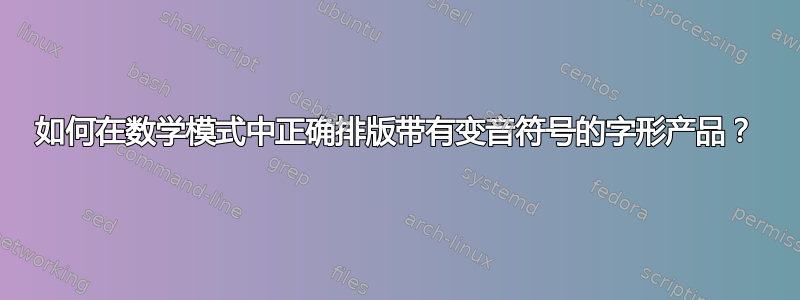
我有两个带变音符号的量的乘积(更准确地说是 和\tilde- ),这给出了这个丑陋的结果。根据您的查看器和缩放选择,该景象可能或多或少令人不悦。\hat\barPDF
另一个问题是变音符号在小写字母上方的高度五,这很可怕,因为d就在它旁边。
我该如何解决这些问题?是否有解决所有这些问题的灵丹妙药?
以下是一些示例的代码:
\documentclass[10pt,a4paper,oneside,reqno]{amsbook}
\usepackage{pxfonts}
\usepackage[utf8]{inputenc}
\usepackage[T1]{fontenc}
\usepackage[english]{babel}
\begin{document}
\begin{equation}
\begin{split}
\tilde{d}\kern1pt\tilde{i}_c\\
\tilde{d}\tilde{v}_{ap}
\end{split}
\end{equation}
\begin{equation}
\begin{split}
\hat{d}\hat{i}_c\\
\hat{d}\hat{v}_{ap}
\end{split}
\end{equation}
\begin{equation}
\begin{split}
\bar{d}\bar{i}_c\\
\bar{d}\bar{v}_{ap}
\end{split}
\end{equation}
\end{document}
...结果:

附言:在产品因素之间使用增加的字距可以使事情变得可以忍受(即避免波浪号粘在一起),但我认为这是一个非常笨拙的技巧,我希望有一个更优雅的解决方案。
PS2:根据要求,我想实现的一个示例(使用Photoshopafter LaTeX :P)。当然,帽子会高高地漂浮在五,但我更喜欢这样。:)

答案1
这是解决 d/v 问题的方法,可以自动插入正确的重音符号字距。这个想法来自我的另一个答案而这又基于我从 TH 学到。命令\ra(“raise accent”) 接受两个参数,即重音和字母。然后,将重音置于与字母相同的高度 d。这对于普通文本和下标/上标同样有效:

pxfonts如果您将其替换为,该解决方案也会有效mathpazo– 我强烈支持 egreg 的这个建议(请参阅对问题的评论)。然而,我要指出的是,这只适用于拉丁字母,所以\ra \hat \gamma不起作用。请注意,与\ra \hat d具有相同的效果,因为\hat d重音不必升高。
就我个人而言,我不会提高口音;我认为这是用一个不美观的东西代替另一个不美观的东西。
\documentclass{article}
\usepackage{pxfonts}
\makeatletter
\newcommand*\ra[2]{%
\begingroup
\mathchoice{\ra@helper{#1}{#2}{\displaystyle}{\textfont}}
{\ra@helper{#1}{#2}{\textstyle}{\textfont}}
{\ra@helper{#1}{#2}{\scriptstyle}{\scriptfont}}
{\ra@helper{#1}{#2}{\scriptscriptstyle}{\scriptscriptfont}}%
\endgroup
#2%
}
\newcommand*\ra@helper[4]{%
\def\currentfont{\the#41}%
\def\currentskewchar{\char\the\skewchar\currentfont}%
\setbox\tw@\hbox{\currentfont#2\currentskewchar}%
\dimen@ii\wd\tw@
\setbox\tw@\hbox{\currentfont#2{}\currentskewchar}%
\advance\dimen@ii-\wd\tw@
\rlap{$\m@th#3\kern\dimen@ii#1{\vphantom{d}\phantom{#2}}$}%
}
\makeatother
\begin{document}
\Huge
$\ra\hat d\ra\hat v_{ap}$
$A_{\ra\hat d\ra\hat v_{ap}}$
\end{document}
答案2
对于 d/v 帽子来说
\hat{d}\hat{v\vphantom{d}\,}\!_{ap}
做你想做的事:

它或许可以与一个通用宏结合起来,使每个重音宏都能提前查看并根据具体情况插入水平字距或垂直支柱。


